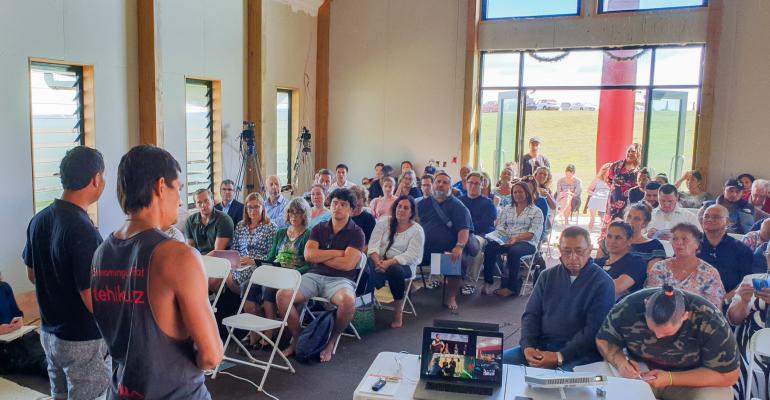Celebrating both ancient and new Māori data knowledge
10 April 2019 | Read time: 6 minutes

Far in the Northern reaches of Te Ika a Māui lies Aurere, northeast of Kaitaia. From a plateau at the top of a hill there, you can see the horizon all around.

It is one of the South Pacific’s most important star compasses, visited by master navigators from all over the Pacific region, and built on the land of the pre-eminent traditional navigator Tā Hekenukumai Puhipi - Sir Hector - Busby, KNZM, MBE, New Zealand Commemoration Medal 1990.
Late in March 2019, Aurere was the setting for a hui about the future of Māori data, co-hosted by SfTI, the Data Iwi Leaders Group represented by Kirikowhai Mikare, and Te Hiku Media represented by Peter-Lucas Jones. On the first day, presentations from intellectual property and knowledge protection leaders sparked rigorous debate as participants contributed to understandings of the unique challenges facing traditional Māori knowledge, language, stories, songs, names and whakapapa, as well as modern scientific achievements.
SfTI’s Manager Vision Mātauranga & Capacity Development Impact Dr Willy-John Martin said presentations from law experts Lynell Tuffery Huria and Tai Ahu highlighted the constraints of current legislative and social protection mechanisms, and the challenge of long-term protection using these legal instruments.
“The law’s not designed to protect things forever. A patent might cover 20 years, and copyright may run out in 50, but those are not useful concepts of time for protecting what’s been around for a thousand years or longer.”
Attendee Mānuka Hēnare, Associate Professor in Māori Business Development at the University of Auckland and member of the SfTI Kāhui Māori advisory group, also believes that a different view of time changes perspectives.
“Some Māori data is older than Europe and North America, and it’s linked by language and culture to the whole of Austronesia through Southeast Asia, Oceania and East Africa. We’re aligned with the world’s booming economies. My view is that we don’t need to be trying to fit within an economic model that’s only been around for a couple of hundred years or less.
“As kaitiaki (guardians) of Māori data today, we should be inspired to value that taonga (treasure) more greatly. Māori have the strength of being able to look past current troubles to the horizon, which means looking beyond the present. We have survived because of our ability to look to the future, and bring it into the present, where it immediately becomes part of the past. In Māoritanga, we are forever looking over the horizon to what’s coming.”

Mānuka also challenged the term ‘indigenous data’, often used to describe the data, language, knowledge and ideas of traditional peoples around the world.
“As a group of kuia and kaumātua at the hui were discussing, using that term frames this ancient knowledge within the last 200 years. Māori are only indigenous by reference to the colonisers. If we’ve been indigenous for 200 years, what were we for the 800 years before that?”
Mānuka instead proposed the term ‘Mana Māori Data’ to mean the holding and maintaining of both ancient and new knowledge.
Associate Professor, Engineering at the University of Auckland, Andrew Mason presented to the hui and says the discussions were useful and robust.
“It was a most interesting and welcome discussion. A particularly interesting idea is whether people have the right to put things like their whakapapa on a website. It might be their own whakapapa, but it also belongs to the wider whanau. In the current legal framework, it could be treated as a whanau trade secret, but beyond that, it’s not protected in any legal sense.
“The hui was a very positive experience, and I was touched when a kuia explained to me that her mother had died, and she wanted my advice in helping track down her mother’s land blocks. She explained that finding the blocks was complicated because her mother used multiple different names, which is a challenging issue we are addressing in our research. It was an example of data ownership challenges in real life.
“Another highlight was seeing the science and technology that Te Hiku Media is applying to Te Reo revitalisation. Their work is the most advanced I have seen in NZ, and demonstrates what a community can achieve on a minimal budget.”

Mānuka says there are also differences in understandings of ownership that are relevant to data.
“In Māoritanga, someone else holding the land title does not stop us talking to the mountain as though we own it.
“A group of elders were saying at the hui that the more you try to hold onto something, the more you lose it. Perhaps widespread usage is the best defence. In the European Union, everything’s in the cloud and nobody knows who owns the data.”
Mānuka says his sense from the hui was that these local kuia and kaumātua among the 100+ attendees valued the discussions and the openness of the co-hosts’ approach.
“Every day, as we attend tangi and events on marae there is talking and waiata, and people are bringing up the past to guide the way as we forge into the future.
“It was symbolic that we were having these discussions on the land and in the presence of that great man Hekenukumai Busby, who is revered across the region for his knowledge of the seas, the skies, the star systems, how to read the waves, and GPS. He is the Dalai Lama of ocean sailing around the pacific, and his approach to protecting all the data he holds has been to share it – for others to hear and interpret, so that we do not lose the kaupapa.
“It was a stunning hui, and a privilege. I have been reflecting that I wish I knew all this 40 years ago.”


